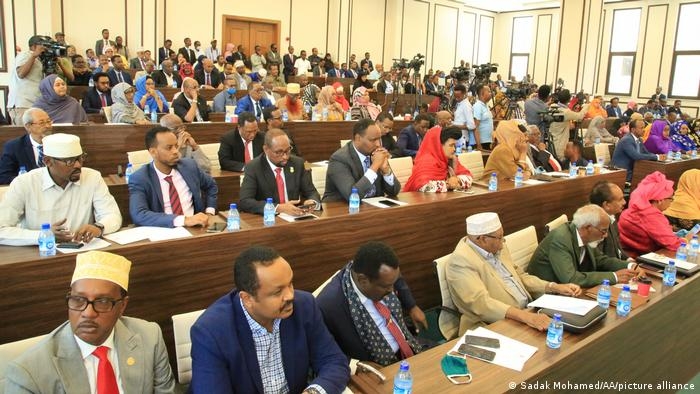source photo: https://www.dw.com/
By Kabakura Jean Bosco Ceusi
Somalia’s political stakeholders signed on Thursday a definitive agreement that paves the way to indirect elections likely to take place before August this year.
The decision followed a marathon week-long talks led by Prime Minister Hussein Roble. This allows the country to go ahead with the delegate system of voting ,earlier arguable, ending weeks of uncertainty.
Mr Roble signed for the Federal Government and Federal States leaders Said Abdullahi Deni (Puntland), Ahmed Abdi Qoorqoor (Galmudug), Ali Hussein Gudlawe (Hirshabelle), Abdulaziz Mohamed Laftagareen (South West) and Ahmed Mohamed Islam Madobe (Jubbaland) signed for their respective Federal States. The Governor of Banadir region and Mayor of Mogadishu, Omar Mohamed Filish, was among the signatories for his metropolis.
Positive step
Roble who chaired the meeting between the Federal Government representatives and Federal Member States, said the deal marked a « historic day »for Somalia State building and governance history » .
Roble further declared to Muqdisho FM&Key media “Several days of negotiations between the federal government of Somalia, Federal Member of State and Banadir Region in the spirit of responsiveness, compromise and consensus have culminated in a mutually acceptable solution to solve the national electoral impasse”.
Roble’s success in reaching an agreement with leaders may have saved the country from a potential crisis. But the leaders must now return to their posts and implement the crucial bits such as ensure security for the elections, prepare venues and also select delegates who will vote for Mps. They in turn will vote for the President. This could roughly cost at least $50 million including adequate security arrangements. Somali politicians, on their side, praised the country leaders for reaching an agreement on the polls.
“Today’s election agreement between the Federal Government of Somalia and its federal Member States finally takes us on the path to elections,” said Ayub Ismail Yusuf, a Senator in the Upper House.
“This agreement is as fair and representative as possible to ensure indirect free and fair elections
We must work towards 1P1V (One Person One Vote),” he added.
Furthermore, the agreement could also represent a personal victory for President Mohammed Farmaajo, who, just a month ago, seemed at odds with his people. His move to extend his term by two years was fiercely opposed by his rivals, the Federal States and the international community. Farmaajo had argued that he wanted to organise universal suffrage, accusing politicians of hostaging the indirect polls.
After pulling back the gear on this, he nominated the widely popular Roble to lead talks on elections, as well as manage their security.
The Thursday agreement is a general acceptance to implement indirect elections under the September 17 Agreement. Each Federal State will select two venues where delegates will elect Mps.
Security arrangements were among the issues that had stalled previous talks. On Thursday, Roble said he will directly supervise the elections and lead reconciliation in the troubled Gedo region of Jubbaland where Somali National Army troops routinely clash with Jubbaland forces.
Under the terms of this agreement,the Prime Minister will chair a committee on security which will have nine members and include representatives from Federal States, the African Union Mission in Somalia (Amisom) and Somali security chiefs .
Details on security arrangements were yet to be shared by Thursday evening. Security arrangements had been among the issues that stalled previous talks, especially between Jubbaland and the Federal Government.
On Thursday, Farmaajo witnessed the signing ceremony at the venue known locally as Afysione, having also weathered a dispute with the African Union after rejecting its special envoy John Mahama.
If the agreement holds, it could cement Somalis’ ability to negotiate for themselves.
However, there were unfinished issues on the election model for representatives from Somaliland. Speaker of the Upper House, Abdi Hashi, a senior politician from the breakaway northern region, had bickered with Roble on how to select delegates. Eventually a delegation of politicians to the Upper House convinced him to attend the signing ceremony.

